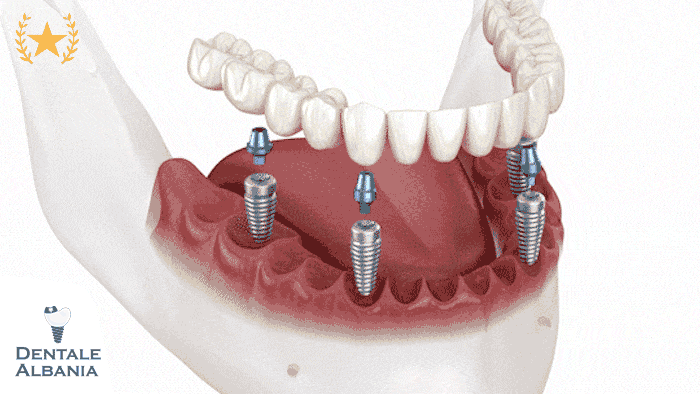What Is a Dental Crown?

A dental crown is a cap that is placed over a damaged or weakened tooth. It’s designed to restore the tooth’s shape, size, and strength, effectively protecting it from further damage. Dental crowns are one of the most common dental restorations, offering both functional and aesthetic benefits. A crown acts as a covering for a tooth that has been extensively damaged by decay, wear, or injury. It provides durability and strength, allowing the tooth to perform its normal functions, such as biting and chewing.
Crowns are custom-made to match the size and color of your natural teeth. This custom fit ensures that your dental crown blends in seamlessly with your smile, whether it’s placed on a front tooth or a molar. The materials used for crowns can range from metal alloys like gold to porcelain, zirconia, or a combination of porcelain and metal. The choice of material depends on factors such as the location of the tooth, the desired aesthetic outcome, and durability.
Why Do You Need a Crown?
Dental crowns are often necessary when a tooth is severely damaged, and a filling would not be sufficient to restore its function. If a tooth has been cracked, fractured, or weakened by decay, a crown helps to protect it from further deterioration. Crowns are also used to restore teeth after root canal treatment, as these teeth are typically more fragile and prone to breakage. Additionally, crowns can improve the appearance of discolored or misshapen teeth, giving you a more natural and aesthetically pleasing smile.
Crowns can also be used to anchor dental bridges, providing support to replace missing teeth. In these cases, the crown serves as an abutment tooth, holding the replacement tooth (pontic) securely in place. In some instances, crowns are placed over dental implants to restore function and appearance after the loss of a tooth.
Types of Dental Crowns
When it comes to dental crowns, there are several options available to suit different needs. These include:
- Porcelain Crowns: Ideal for front teeth, porcelain crowns offer a natural appearance that closely resembles the look of real teeth. They are highly aesthetic but may not be as durable as metal crowns, making them best suited for visible areas where strength is not the primary concern.
- Metal Crowns: Metal crowns, made from gold, platinum, or other alloys, are incredibly durable and can withstand the pressure of chewing. These crowns are often used for back teeth, where they are less visible.
- Porcelain-Fused-to-Metal Crowns: These crowns offer a good balance between durability and aesthetics. The metal core provides strength, while the porcelain exterior mimics the appearance of natural teeth.
- Zirconia Crowns: Known for their strength and aesthetic appeal, zirconia crowns are a great choice for both front and back teeth. They are durable, long-lasting, and less likely to chip than other types of crowns.
Each type of crown offers unique benefits depending on the individual’s needs, and your dentist can help you choose the best option based on your tooth’s location, the amount of remaining tooth structure, and your cosmetic goals.
How Long Do Dental Crowns Last?
The lifespan of dental crowns is one of the key considerations when deciding whether to undergo this procedure. Understanding how long a crown can last can help you manage expectations and prepare for potential future dental work.
Typical Lifespan of Dental Crowns
Dental crowns can last anywhere from 5 to 15 years, depending on several factors. The type of material used, your oral hygiene habits, and how much pressure the crown endures over time all contribute to how long it will stay in place.
- Porcelain Crowns: These crowns are aesthetically pleasing but may wear down faster than metal crowns, especially if they are on back teeth. Typically, porcelain crowns last 5 to 10 years before needing replacement.
- Gold Crowns: Known for their durability, gold crowns are the most long-lasting. They can easily last 10 to 15 years or even longer with proper care. However, due to their color, gold crowns are mainly used on back teeth where they are not visible.
- Zirconia Crowns: These crowns are incredibly durable and can last between 10 and 15 years. They offer a balance of strength and aesthetic appeal, making them suitable for both front and back teeth.
While all-ceramic crowns offer the most natural appearance, they might not last as long under heavy wear and tear. The wear on crowns can also be affected by things like grinding your teeth or eating hard foods, which can significantly shorten their lifespan.
What Happens When a Crown Fails?
Even though dental crowns are designed to be long-lasting, they can fail or degrade over time. Understanding the signs that a crown is failing and what to do next is crucial for maintaining your dental health.
- Signs of a Failed Crown:
- Sensitivity: If you experience discomfort or sensitivity when biting or chewing, it could be a sign that the crown is no longer fitting properly or that the underlying tooth is exposed.
- Loose Crown: If the crown becomes loose, it can no longer properly protect the tooth underneath. This may also allow bacteria to seep in, leading to decay.
- Visible Cracks or Chips: If the crown is cracked, chipped, or damaged, it can no longer function effectively, and it may need to be replaced to prevent further damage to the tooth.
- How to Extend the Lifespan of Your Crown:
- Good Oral Hygiene: Brushing your teeth at least twice a day and flossing daily will help keep both the crown and the underlying tooth healthy.
- Regular Checkups: Regular visits to your dentist ensure that any early signs of crown failure are caught early and that the crown is properly maintained.
- Avoid Hard Foods: Refraining from chewing on hard foods, ice, or other substances can prevent your crown from cracking or loosening prematurely.
If you notice any issues with your crown, it’s essential to visit your dentist as soon as possible to avoid further complications.
Conclusion
Dental crowns are essential restorations that can help preserve your teeth for years. However, like any dental procedure, they come with considerations about longevity, cost, and care. The material you choose for your crown can affect its lifespan, and regular maintenance is necessary to ensure your crown lasts as long as possible.
How Is a Dental Crown Fitted?

The process of getting a dental crown involves multiple steps to ensure that the crown fits securely and provides long-lasting protection for your tooth. Here’s what you can expect during the procedure.
What is the Crown Fitting Process?
The fitting of a dental crown is a detailed procedure that typically requires two visits to the dentist. Here’s a breakdown of what happens during each stage:
- Initial Consultation:
- The dentist will examine your tooth and take X-rays to assess the extent of damage or decay.
- They will discuss your options and help you decide which type of crown (e.g., metal, porcelain, ceramic) is best suited for your situation.
- Tooth Preparation:
- The dentist will prepare the tooth that needs the crown by removing a layer of enamel to make space for the crown. This step ensures that the crown fits properly and does not affect your bite.
- If the tooth is severely damaged, the dentist may add a filling material to help build it up and provide a solid foundation for the crown.
- Molds and Impressions:
- Once the tooth is prepared, the dentist will take an impression of the tooth using either a mold or a digital scanner. This impression will be sent to a dental lab to fabricate your crown.
- A temporary crown will be placed over the tooth to protect it while the permanent crown is being made.
- Crown Fabrication:
- The dental lab will craft your crown based on the impression, and it will be designed to match the color and shape of your natural teeth.
- The process of creating a crown can take 2 to 3 weeks, depending on the type and material of the crown.
What Happens After the Crown Is Fitted?
Once your permanent crown is ready, you’ll return to the dentist for the final fitting. Here’s what happens next:
- Final Fitting:
- The dentist will remove the temporary crown and check the fit of the permanent one.
- The crown will be adjusted if necessary, to ensure that it fits snugly and aligns properly with your bite.
- Cementing the Crown:
- Once the crown fits perfectly, the dentist will cement it in place using dental adhesive. This ensures that the crown stays securely attached to the underlying tooth.
- Post-Procedure Care:
- After the crown is fitted, you may experience some sensitivity to temperature or pressure, especially if you had a root canal treatment.
- Your dentist may advise you to avoid chewing on hard foods or sticky substances for a few hours while the cement fully sets.
- Follow-Up Appointment:
- A follow-up appointment may be scheduled to ensure that the crown is functioning properly and that there are no issues such as discomfort or poor fit.
Can You Get a Crown in One Day?
In some cases, it’s possible to get a crown in a single visit, thanks to advanced CEREC technology. CEREC (Chairside Economical Restoration of Esthetic Ceramics) allows the dentist to create a custom crown right in the office, eliminating the need for a second visit and a temporary crown.
- CEREC Process:
- Digital Scans: The dentist takes digital scans of your tooth, which are used to create a 3D model.
- Crown Creation: The information is sent to a milling machine that carves the crown from a block of ceramic.
- Immediate Fitting: Once the crown is ready, it is fitted immediately.
- Benefits of One-Day Crowns:
- Convenience: You only need one appointment, which saves time.
- No Temporary Crown: There’s no need to wear a temporary crown or wait for weeks for your permanent crown.
However, not all dental offices are equipped with CEREC technology, so you’ll need to check with your dentist to see if this option is available.
What Are the Costs of Dental Crowns?

When considering dental crowns, it’s important to understand the financial aspects of the procedure. Costs can vary based on several factors, including the type of crown, where the procedure is done, and whether it is done through private practice or the NHS.
How Much Do Dental Crowns Cost in the UK?
The cost of dental crowns in the UK can range significantly depending on several factors:
- Private vs NHS Crowns:
- Private Practices: Private dentists offer a wide variety of crowns, ranging from £400 to £1,200 or more, depending on the material used. More complex crowns, such as ceramic or gold, tend to cost more.
- NHS Crowns: The NHS offers dental crowns for a fixed cost under Band 3, which is approximately £319.10. However, the type of crown offered is typically limited, and not all types may be available.
- Material Choice:
- Metal Crowns: Metal crowns, often made of gold or silver, tend to be the least expensive option, typically priced around £400 to £700. They are durable but may not be suitable for visible areas.
- Porcelain Crowns: These crowns, which are often used for front teeth, are aesthetic but cost more due to their natural appearance, often starting from £600.
- Ceramic Crowns: Ideal for front teeth due to their natural appearance, ceramic crowns are priced similarly to porcelain crowns and can range from £600 to £1,200.
- Zirconia Crowns: Zirconia is another durable and aesthetic option, often priced around £800 to £1,200.
- Additional Costs:
- If the tooth preparation requires additional work, such as a root canal treatment or extensive reshaping, the total cost of the procedure can increase.
- Some dentists may charge extra for X-rays, impressions, or consultation fees, which should be considered when budgeting for the procedure.
How Much Do Dental Crowns Cost in Albania?
The cost of dental crowns in Albania is generally more affordable compared to many other countries, including those in Western Europe and the United States. However, several factors determine the final price, including the material used, the complexity of the procedure, and the clinic you visit. Here’s a detailed breakdown of dental crown costs in Albania.
Average Price of Dental Crowns in Albania
On average, the cost of a dental crown in Albania typically ranges between €150 and €400. This price can fluctuate based on the following factors:
-
Material of the Crown:
-
Porcelain Crowns: These are among the most common choices for their aesthetic appeal, especially for visible teeth. In Albania, porcelain crowns cost around €250 to €400.
-
Metal Crowns: Often used for back teeth where aesthetics are less of a concern, metal crowns (including gold and silver alloys) typically range from €150 to €300.
-
Porcelain-Fused-to-Metal (PFM) Crowns: A combination of metal and porcelain, these crowns usually cost between €200 and €350.
-
Zirconia Crowns: Known for their durability and natural look, zirconia crowns in Albania may cost around €300 to €450.
-
-
Private vs. Public Health Care:
-
Most dental procedures, including crown placements, are available in Albania through private clinics. While NHS-like options for dental crowns are limited, private clinics typically offer lower prices than those in many Western countries, but the quality remains high.
-
Some clinics in Albania also offer discounts for multiple treatments or if you’re getting multiple crowns, which makes it an attractive option for dental tourism.
-
-
Complexity of the Case:
-
The cost of your crown may also depend on the condition of the tooth that requires restoration. For example, if the tooth needs additional treatment such as a root canal, the overall cost will increase. Root canals can add €100 to €200 to the total cost of your dental crown.
-
In cases where the tooth needs extensive reshaping or a post and core (a metal insert used to stabilize the crown), the price may go up as well.
-
Why Are Dental Crowns in Albania More Affordable?
-
Lower Overhead Costs:
-
Dental practices in Albania have lower overhead costs compared to those in Western Europe and the U.S. This translates into lower treatment costs for patients.
-
-
Skilled Dentists at Competitive Prices:
-
Albania is known for having well-trained and highly skilled dentists who are often educated in top European universities. Despite the lower cost of living, these dentists maintain high standards, ensuring quality results at a fraction of the price.
-
-
Dental Tourism:
-
Albania has become a growing hub for dental tourism, with patients from Europe and beyond traveling to the country for affordable dental care. This competition among private clinics helps keep prices low while ensuring high-quality care.
-
What’s Included in the Cost of a Crown in Albania?
-
Initial Consultation:
-
The cost of getting a crown in Albania usually includes the initial consultation where your dentist will evaluate your tooth, take X-rays if needed, and discuss the most suitable crown options for your case.
-
-
Crown Placement and Fitting:
-
The final price typically covers the fitting of the crown, which involves preparing the tooth, taking impressions, and placing the permanent crown once it’s ready.
-
-
Follow-Up Visits:
-
After the crown is fitted, a follow-up appointment is usually included in the cost to ensure proper fitting and make any necessary adjustments.
-
Is Dental Insurance Available for Crowns in Albania?
Dental insurance is not commonly used in Albania as it is in other countries like the U.S. or the UK. Most patients pay out of pocket for dental crowns, although some clinics may offer payment plans or financing options to help spread out the cost. If you have dental insurance from your home country, check if it covers international dental care, as some insurance providers may reimburse you for the cost of treatment abroad.
Conclusion
In conclusion, dental crowns in Albania are not only more affordable compared to many other countries, but they also offer great value in terms of quality and service. Whether you’re considering porcelain, metal, or zirconia crowns, Albania provides competitive pricing options without sacrificing quality.
Are Dental Crowns Covered by Insurance?
Most dental insurance plans partially cover the cost of dental crowns, but the level of coverage can vary:
- Insurance Coverage:
- Private Insurance: Many private dental insurance policies provide partial coverage for crowns, with a set annual limit. Depending on the plan, you may need to pay a portion of the cost, such as a deductible or copayment.
- NHS Coverage: The NHS may cover crowns if there is a medical need, but coverage is limited to Band 3 treatment. If you are seeking an aesthetic crown or a more advanced material, you may need to pay the full cost privately.
- How to Maximize Your Insurance:
- Check with your insurance provider to confirm which types of crowns are covered and if there are any limits or exclusions.
- Some insurance plans might cover a percentage of the costs if the crown is placed for functional reasons rather than cosmetic ones.
Can I Get a Crown on the NHS?
In the UK, it is possible to get a crown on the NHS, but there are certain limitations:
- Eligibility:
- NHS crowns are typically available for patients who have a medical need for them, such as to repair a broken or decayed tooth.
- Cosmetic crowns, such as those for aesthetic purposes or for non-essential teeth, may not be covered by the NHS.
- Process for NHS Crowns:
- You will need to visit an NHS dentist for an evaluation to determine if a crown is necessary.
- If deemed necessary, the NHS will cover the cost under Band 3, and you will pay the fixed NHS fee of approximately £319.10.
- Differences Between NHS and Private Crowns:
- NHS crowns may not offer the same material choices as private options. For example, metal crowns may be the most common option under the NHS, and aesthetic crowns such as porcelain or ceramic may not be available.
How Do Dental Crowns Affect Oral Health?
Dental crowns play an essential role in maintaining oral health by protecting damaged teeth and restoring functionality. However, it is important to understand the benefits and risks associated with having a dental crown placed.
How Do Crowns Protect Your Teeth?
Dental crowns serve as a protective cover for weakened or damaged teeth. They help prevent further damage and restore the tooth’s functionality. Here’s how crowns help protect your teeth:
- Protection Against Further Damage:
- Crowns encapsulate a tooth that has been weakened by decay, cracking, or fracturing, preventing further breakdown.
- After a root canal, the tooth may become brittle, and a crown helps to stabilize the tooth, reducing the risk of cracking or breaking.
- Restoring Functionality:
- Crowns provide strength, allowing the tooth to function normally while eating or speaking. This helps maintain the alignment of the teeth and protects adjacent teeth from wear and tear.
- Prevention of Infection:
- A well-fitted crown helps to seal the tooth, preventing bacteria from entering and causing further decay or infections beneath the crown.
What Are the Risks of Having a Dental Crown?
While dental crowns are highly beneficial, there are also some risks associated with their use. It’s important to be aware of these potential complications:
- Tooth Sensitivity:
- After the crown is placed, you may experience sensitivity to hot and cold. This is typically temporary, but it can persist if the crown is not fitted correctly or if there is significant wear on the tooth beneath it.
- Gum Irritation:
- Crowns, especially those with metal bases, can sometimes irritate the gums, causing redness or discomfort. Proper care during the fitting process can help minimize this risk.
- Decay Under the Crown:
- If the crown is not properly sealed, bacteria may enter and cause decay under the crown. This is why it is important to maintain good oral hygiene and get regular checkups to ensure the crown is in good condition.
- Crown Damage:
- Crowns, especially porcelain ones, are susceptible to chipping or cracking under excessive pressure. Avoid chewing on hard objects like ice or using your teeth as tools to prevent damaging the crown.
Dental Crown Aftercare: How to Care for Your Crown

Proper aftercare is crucial to ensuring that your dental crown remains functional and durable over time. By following the right care routine, you can maximize the longevity of your crown and maintain optimal oral health.
What is the Best Way to Look After Your Dental Crown?
Taking care of your dental crown involves practicing good oral hygiene and adopting habits that protect both your crown and the surrounding teeth. Here are key tips on how to care for your crown:
- Regular Brushing:
- Brush your teeth at least twice a day using a soft-bristled toothbrush and fluoride toothpaste. This will help remove plaque and food particles around the crown, preventing decay and gum disease.
- Flossing Daily:
- Floss around your crown to remove food particles and plaque buildup that a toothbrush might miss. Be gentle when flossing to avoid damaging the crown or the gums.
- Avoid Hard and Sticky Foods:
- Refrain from chewing on hard foods, like ice, popcorn kernels, or hard candy, as they can damage or dislodge your crown. Sticky foods like caramel or taffy can also cause the crown to come loose over time.
- Avoid Teeth Grinding:
- If you grind your teeth at night, talk to your dentist about wearing a nightguard to protect your crown and prevent excessive wear on your teeth.
- Use a Mouthguard for Sports:
- If you play contact sports, consider using a mouthguard to protect your crown from impacts that could potentially cause it to crack or loosen.
What Should You Do If Your Crown Falls Off?
It’s possible for your crown to fall off or become dislodged due to wear, pressure, or a poorly fitted crown. If this happens, follow these steps:
- Reattach the Crown Temporarily:
- If the crown has come off but is still intact, you can temporarily reattach it using dental cement or temporary adhesive from a pharmacy until you can see your dentist.
- Keep the Crown Safe:
- Place the crown in a safe container and avoid chewing on the affected tooth until you can get a new one fitted.
- Visit Your Dentist ASAP:
- Schedule an appointment with your dentist to have the crown properly refitted or replaced. Your dentist may need to adjust the tooth or crown to ensure a proper seal.
Frequently Asked Questions About Dental Crowns

Is a Dental Crown Painful to Get?
When it comes to getting a dental crown, pain is a common concern. However, the process is generally not painful. Here’s what you need to know about the pain management during the procedure:
- Local Anesthesia:
- Before placing the crown, your dentist will numb the area with local anesthesia to ensure you don’t feel any pain during the procedure. This ensures that you are comfortable throughout the process.
- Mild Discomfort After Procedure:
- After the anesthesia wears off, some mild discomfort or sensitivity may occur around the tooth that received the crown. This is common and usually subsides within a few days. Over-the-counter pain relievers can help manage any discomfort.
- Long-Term Pain Relief:
- Once the crown is in place and your tooth is properly protected, you should experience relief from any pain or discomfort caused by a cracked or decayed tooth.
Can a Crown Last a Lifetime?
While dental crowns are durable, they don’t last forever. Several factors influence how long your crown will last, including:
- Material Type:
- The material of your crown affects its longevity. Gold crowns tend to last longer than porcelain crowns because gold is more durable and less prone to wear. However, porcelain crowns offer a more natural appearance but may require replacement sooner.
- Care and Maintenance:
- Proper oral hygiene and regular dental checkups are crucial to extending the lifespan of your crown. By brushing, flossing, and avoiding hard foods, you can help protect your crown from damage.
- Grinding or Clenching:
- If you suffer from bruxism (teeth grinding), the lifespan of your crown may be reduced due to the constant pressure on the tooth. Wearing a nightguard can protect the crown and extend its life.
- Age of the Crown:
- Most crowns last between 5 to 15 years, depending on the factors mentioned above. Regular dentist visits will help monitor the condition of your crown and determine when it needs to be replaced.









